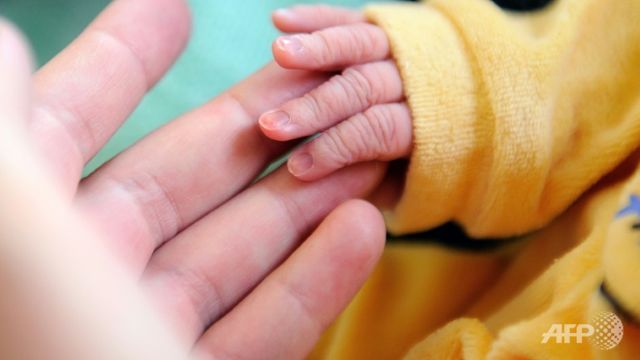Woman has baby in UK from ovary frozen in childhood
 |
| (File photo: AFP/Philippe Huguen) |
Moaza Al Matrooshi, 24, had her right ovary removed when she was nine years old before undergoing chemotherapy treatment for a severe blood disorder, according to the University of Leeds where the ovarian tissue was frozen.
Her fertility was restored after the preserved tissue was transplanted last year, the university said.
"It is the first time that the success of the procedure has been shown in a pre-pubertal girl, and I'm delighted that this young woman has had her baby," said Helen Picton, head of the university's reproduction and early development division, who carried out the freezing.
The young woman gave birth to a baby boy at the private Portland Hospital in London on Tuesday, according to the BBC.
"It's like a miracle. We've been waiting so long for this result -- a healthy baby," she told the British broadcaster.
The Dubai national was born with beta thalassaemia, a blood disorder that reduces the production of haemoglobin and can be life-threatening.
She needed chemotherapy in preparation for a bone marrow transplant to treat the disorder but the treatment damaged her remaining ovary, bringing on the menopause in her early twenties, Leeds university said.
"Following her transplant her hormone levels began returning to normal, she began ovulating and her fertility was restored," the university explained on its website.
"Moaza is a pioneer and was one of the first patients we helped back in 2001, before any baby had been born from ovary tissue preservation," said Picton.
Last year, a Belgian woman gave birth after undergoing the same procedure with ovarian tissue frozen when she was 13 years old.
However, "unlike Moaza, she had begun going through puberty when her ovary was removed," according to the university.
Adam Balen, chairman of the British Fertility Society, said: "This is a ground-breaking step in this area of fertility preservation and has the potential to help many young people who face cancer treatment preserve their fertility chances in the future."
What the stars mean:
★ Poor ★ ★ Promising ★★★ Good ★★★★ Very good ★★★★★ Exceptional
Latest News
More News
- 72 nations sign landmark Hanoi cybercrime convention (October 26, 2025 | 18:00)
- UN Secretary-General commends Vietnam’s global leadership (October 26, 2025 | 09:00)
- APEC finance ministers convene to tackle regional challenges (October 22, 2025 | 17:31)
- Rewiring global trade: ASEAN’s rise as supply chain hub (October 17, 2025 | 11:40)
- Vietnam attends first World Nuclear Week Forum in Russia (September 26, 2025 | 10:50)
- Vietnam attends 69th session of IAEA General Conference (September 16, 2025 | 10:00)
- ADB, WB pledge over 12 billion USD for ASEAN power grid, renewable energy projects (August 15, 2025 | 14:18)
- Lowy Institute proposes AI-based tobacco control solutions for ASEAN (August 15, 2025 | 14:14)
- Cloud computing policy to position Malaysia as regional hub by 2030 (August 15, 2025 | 14:11)
- Thailand, Cambodia suffer numerous cyber attacks (August 05, 2025 | 16:19)
















 Mobile Version
Mobile Version